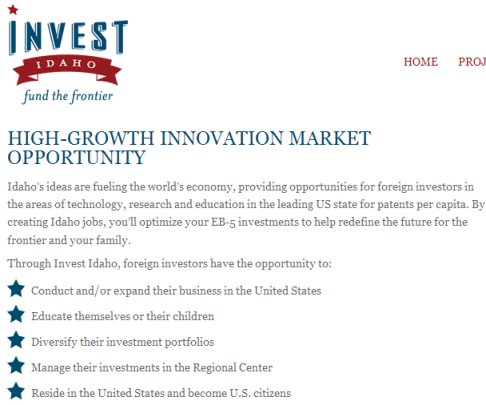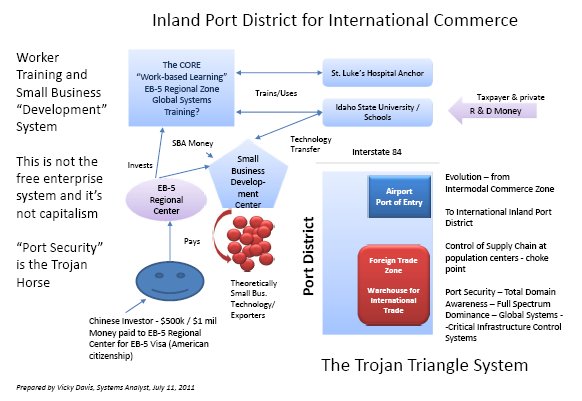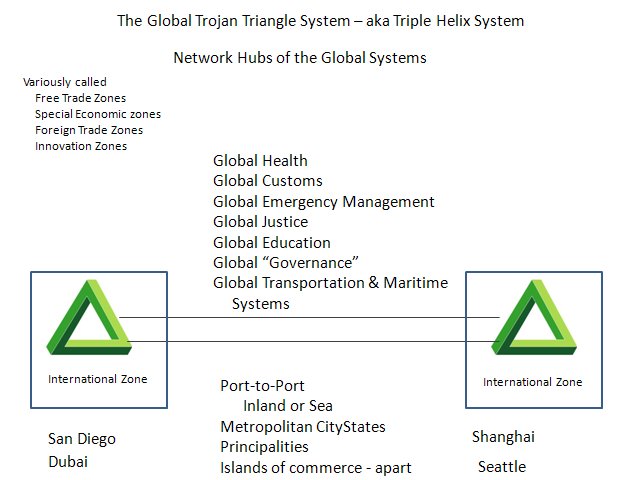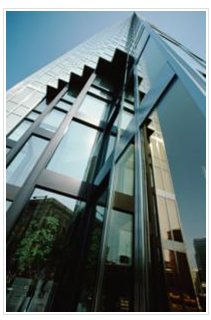Engineering the Global Economy
Somewhere on my hard drive, there is a diagram that shows the "innovation
cycle". I don't remember if that's what they called it, but the cycle is that as new "clean environment"
technologies are developed, regulations are changed to force you to buy them -
thereby creating a demand for them. The demand then spurs further
development for more technologies creating a supposedly virtuous (depending on
whose pockets are being padded) cycle of innovation and clean environment.
Those crappy curly horrible light bulbs are a classic example. The
light is so terrible that I'd rather sit in the dark than use them. They
are expensive and they have mercury in them so they can't be thrown in the trash
with everything else but supposedly they are "innovative". There
was nothing wrong with the light bulbs we've been using for a hundred years.
They are cheap, environmentally sound as all components are recyclable and they
provide good light. The point is that the supply
and demand model for clean technologies is completely artificial. The
demand for the new light bulbs is created by regulation rather than the need in
the consumer market for a better product with the irony being that the alleged
reason for the new light bulbs is protection of the environment when they are
worse for the environment than the old light bulbs. What that tells
you is that it is the economy that is being engineered and the issue of the
light bulbs is of secondary importance.
Some years ago, when I was researching the Club of Rome, I found a transcript of a speech given by
Alexander King at the first Holst Memorial Lecture at the Eindhoven University
of Technology in Eindhoven, Netherlands in 1977. Alexander King was both a
member of the Club of Rome and the Scientific Director of the Organization for
Co-operation and Economic Development (OECD). The title of the report is:
The Role of the Engineer and the Engineering Sciences in Future Society
This report provides the background thinking for the New Economy of the
global system and he talks about the role of engineers in designing the future:
The following is an excerpt from page 8 -
[invention of the telephone]... it was during this period that the basic
characteristics of engineerings began to be formulated. Sadi Carnot,
who enunciated the second law of thermodynamics expressed clearly the
qualities to be expected of the engineer. 'To know how to appreciate in each
case at their true value, the considerations of convenience and economy
which may present themselves; know how to discern the more important from
those which are only accessories; to balance them properly against each
other in order to obtain the best results by the simplest means; such should
be the leading characteristics'.
Engineering has been defined as the art of applying mathematics and science
to the economic use of materials and the forces of nature with judgment
based on study and experience. The term economic should be interpreted
broadly in terms of the optimum use of capital, materials, energy and human
skills, but with appreciation of moral, ethical and aesthetic values in the
satisfaction of human needs.
That description is the essence of systems thinking and systems
design. Every design decision regarding reorganization and redefining roles is
based upon a cost-benefit-risk calculation. The flaw in the thinking
occurs when the engineers move into the social arena to design systems that
impose external force on people to make the design work. Appreciation for
moral, ethical and aesthetic values are secondary considerations behind
optimization of capital, materials, energy and human resources.
The result of using engineers for social systems is an immoral and unethical
system - that is optimally efficient - a "lean, mean, killing machine".
The tendency might be to think that because this speech was
given in 1977 by a Scotsman who worked for an international organization, that
his ideas are irrelevant to today. Nothing could be further from the
truth. In fact, Alexander King was ahead of his time. On page Page
[14 (15)] he mentions a 1971 report prepared by D.H. Brooks titled
Science, Growth and Society - a New Perspective, OECD. I looked for the
report and found a report prepared by the Congressional Research Service titled
Science and
Technology Policymaking Primer, dated May 27, 2009 that also references the
Brook's Report.
The Engineered Economy
The Swedish Triple Helix - what I called the Trojan Triangle is
a key element to the engineered design of the new economic system. The
idea was to design a "center of innovation and commerce" - to facilitate the
development of new, technology based products supposedly for a "clean and green
environment". At it's core, the idea is to commodify genius - which makes
me laugh every time I think about it. The following is a diagram I did a
couple of years ago to show the small business bubble machine. Each one of
those small businesses supposedly is created by the spark of genius that
produced a new product or service.
It's an engineered system. It would be efficient and cost
effective if it wasn't based on wishful thinking. It's rather like
spending your whole paycheck on lottery tickets - betting that you'll get the
one with the winning number. The truth is, that the idea of commodifying
genius is simply a marketing ploy for rubes.
Yesterday, the
Daily Bell had an article titled,
Imram Hussain on Frontier Market Investing and the UAE Tax Free Zone in
which the Daily Bell interviews Hussain.
The 'tax free
zone' is a Trojan Triangle in the UAE. The idea ultimately is for all
international zones in the global system to be tax free for corporations with
the slaves in the surrounding area to provide everything for free to the
"producers" - including electricity. Of course nobody will come right out
and say that, but the global competition is to provide the most attractive place
for businesses to do business - and that means in exchange for the crappy jobs
created, the slaves in the surrounding area will be working to provide gifts of
production resources to the businesses. As I said above, it is a reverse
system in which people serve business rather than the other way around.
Imram Hussaid was
in the United States before and on 9/11 - shortly after which he left. His
story about the circumstances for leaving the U.S. and his beginnings in Dubai
are dubious at best - but I'll let that go for the moment.
The following are excerpts from the interview:
| |
 |
 |
Imran Hussain:
After 9/11, I decided I wanted to return to Dubai, but
it took me a year to find a job. They simply didn't
appreciate my US experience. Eventually, I found
something with the government of Ras Al Khaimah in the
RAK
Free Trade Zone.
What they hired me to
do, because I spoke several languages including English,
was to help companies establish their businesses and
residency in the United Arab Emirates and especially
Dubai. There are many advantages to doing this if you
wanted to be involved in business in the Middle East.
Daily Bell:
What are those?
Imran Hussain:
When you set up your business properly in the UAE, you
can avoid taxes so long as you are involved in
international business. It is a significant advantage
and many are interested in taking advantage of it. I
relocated almost 1,800 companies and individuals in only
four years.
---
Imran Hussain:
O2 Consultant is a consultancy firm specialized in
company incorporation that alleviates both income taxes
and corporate tax. I should note, however, that a 5%
custom duty has to be paid on import if the products are
to be sold in UAE.
Daily Bell:
Can I operate business from Dubai, if the
company is set up in any other Emirates?
Imran Hussain:
Yes, you can operate business from Dubai and open a bank
account – also in Dubai, but the certificate of origin,
if required, has to be obtained from the Chamber of
Commerce where the company is set up, for export
proposes.
---
Imran Hussain:
From an investing standpoint, Cambodia is an interesting
place. They were ruled directly by the army, but that is
over now. Of course, it is high risk, but high reward,
too. They need everything in Cambodia, everything ...
Thailand is good for small business and Vietnam could be
a good option.
Daily Bell:
These are what you call "frontier"
countries. Tell us more about frontier
investing. It's not a well known concept.
Imran Hussain:
Supposedly,
the term was created
by International Finance
Corporation's Farida Khambata in
1992. It is for investing that
is more aggressive than emerging
markets – that is, it has more
risk. Eventually, as capital
flows into these countries, the
liquidity goes up and the
volatility goes down. But
investors that are looking for
high-risk, high-reward
opportunities can be attracted
to frontier investing because of
the promise of high returns.
|
|
 |
 |
|
|
Here are some
American companies "partnering with Dubai"
Below are some links about Farida Khambata but for now, I'd like to focus on
this one:
Congressional Directory - published by the Government Printing Office under
the heading of International Development Associations.
| |
 |
 |
INTERNATIONAL DEVELOPMENT
ASSOCIATION
[The officers, executive directors, and alternates are the
same as
those of the International Bank for Reconstruction and
Development.]
INTERNATIONAL FINANCE CORPORATION
President.--James D. Wolfensohn.
Executive Vice President.--Peter Lutz Woicke.
Vice President:
Human Resources and
Administration.--Dorothy H. Berry.
Operations.--Assaad J. Jabre.
Portfolio and Risk
Management.--Farida Khambata.
Legal.--Carol F. Lee.
Private Sector Development / Chief
Economist.--Michael U. Klein.
|
|
 |
 |
|
|
The International Bank for Reconstruction and Development is the World Bank and
the International Finance Corporation is a specialized agency of the United
Nations. With that kind of connection, I searched to find out about
the International Finance Corporation:
| |
 |
 |
|
http://finance.laws.com/international-finance-corporation
International Finance Corporation Role
The
International Finance
Corporation is a United Nations agency that directly invests in
companies and guarantees
loans
to private investors in the global marketplace. The International Finance
Corporation is affiliated with the World Bank and was created to promote a
sustainable private sector through the investment in developing economies as
a means to reduce poverty and improve the lives of those residing in
struggling nations.
The funds delivered to such nations are typically used to benefit the nation
as a whole. Through the delivery of funds, these developing economies can
invest and subsequently supply their people with improved public services
such as paved roads, public transportation, the establishment of
business centers, and an overall improvement of the nation’s
infrastructure.
- See more at: http://finance.laws.com/international-finance-corporation#sthash.2XGeVGWG.dpuf
The
International Finance Corporation is a United Nations agency that
directly invests in companies and guarantees loans to private investors in
the global marketplace. The International Finance Corporation is affiliated
with the World Bank and was created to promote a sustainable private sector
through the investment in developing economies as a means to reduce poverty
and improve the lives of those residing in struggling nations.
The funds delivered to such nations are typically
used to benefit the nation as a whole.
Through the delivery of funds, these
developing economies can invest and subsequently supply their people with
improved public services such as paved roads, public transportation, the
establishment of business centers, and an overall improvement of the
nation’s infrastructure.
http://www.britannica.com/EBchecked/topic/290917/International-Finance-Corporation-IFC
International Finance Corporation (IFC),
United Nations (UN) specialized agency affiliated with but legally separate from
the International Bank for Reconstruction and Development (World Bank).
Founded in 1956 to stimulate the economic development of its members by
providing capital for private enterprises, the IFC has targeted its aid toward
less-developed countries and has been their largest multilateral source of
private-sector equity financing and loans. The IFC is headed by a president, who
also serves as president of the World Bank; governors and executive directors of
the World Bank also serve at the IFC, though it has its own operational and
legal staff. Headquartered in Washington, D.C., its original membership of 31
had grown to about 175 by the beginning of the 21st century.
As a point of curiosity, each of
the above articles had pictures - and both pictures were
from angles that revealed triangles - pyramids.
|
|
 |
 |
|
|
| |
|
|
Are you ready for it? Here's
the punch line.... one of the EB-5 regional centers that was soliciting foreign
investment to Idaho was this one:
|
------------------>
"Fund the
Frontier"
|
 |
Another one....
the incentive to form the partnership among law enforcement in the Boise area
was for the enhanced 911 system. (Notice that Imram Hussaid worked
for ATT before becoming involved in Frontier investing (in Trojan
Triangles in third world countries).
And while you're
pondering all of that, you can watch this video about Dubai. The oil
sheiks of the Middle East don't need money. They built their tax free
trade zone to draw businesses away from the United States and other countries in
the developed world thereby attacking the economies of the developed world.
This is economic jihad. And
the so-called leaders of this country are so greedy and stupid or greedy and
evil - take your pick - that they won't admit that the global economy isn't
working and won't work because there are other means of war besides bullets and
bombs.
Slaves of Dubai
.... the future for your children and grandchildren and it's the result of
engineering the global economy and our economy.
Vicky Davis
February 3, 2014
Additional Reading:
Farida Khambata
Frontier Markets - pdf on Frontier
Markets
http://apps.esade.edu/facultybio/downloadDoc?fbitem=70339&tipodoc=WD1
http://valueearning.com/page/Frontier_markets.html
http://markets.ft.com/research/Markets/Tearsheets/Directors-and-dealings?s=BKM:LSE
http://www.marketvisual.com/d/abdaeaf3-8c54-433a-9baf-41c6b3dacc0f
Professional Responsibility: The Role of
Engineering in Society
http://www.me.utexas.edu/~srdesign/paper/
Remember
Dubai?




